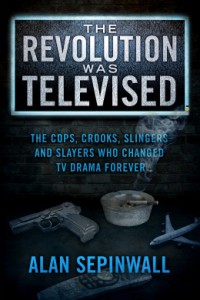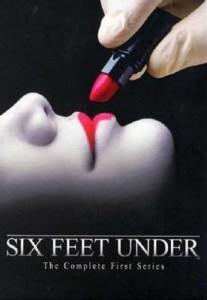Interview: Alan Sepinwall on writing his TV history
 Alan Sepinwall’s The Revolution Was Televised: The Cops, Crooks, Slingers and Slayers Who Changed TV Drama Forever is one of what will likely become many popular histories of television in the twenty-first century. The book, self-published in 2012 before being republished in May by Touchstone, is a compelling artifact for me on two levels. The first is as an extension of Sepinwall’s work as a television critic, an effort to consolidate what has become a sprawling secondary textuality spanning pre-air reviews, episodic criticism, podcasts, and Twitter conversations into a single volume on the past fifteen years of television drama. The second is as a part of a broader discourse of television quality, and on the “revolutionary” period that is also the subject of considerable popular press commentary and Brett Martin’s recently released Difficult Men: Behind The Scenes of A Creative Revolution: From The Sopranos and The Wire to Mad Men and Breaking Bad.
Alan Sepinwall’s The Revolution Was Televised: The Cops, Crooks, Slingers and Slayers Who Changed TV Drama Forever is one of what will likely become many popular histories of television in the twenty-first century. The book, self-published in 2012 before being republished in May by Touchstone, is a compelling artifact for me on two levels. The first is as an extension of Sepinwall’s work as a television critic, an effort to consolidate what has become a sprawling secondary textuality spanning pre-air reviews, episodic criticism, podcasts, and Twitter conversations into a single volume on the past fifteen years of television drama. The second is as a part of a broader discourse of television quality, and on the “revolutionary” period that is also the subject of considerable popular press commentary and Brett Martin’s recently released Difficult Men: Behind The Scenes of A Creative Revolution: From The Sopranos and The Wire to Mad Men and Breaking Bad.
In this two-part interview, I spoke with Sepinwall about these two subjects in the hopes of further exploring where the book fits within both the field of television criticism and within larger discourses around how this period in television history is being memorialized.
What were the goals you set for yourself when you sat down to write this book?
I wanted there to be a kind of permanent record of the era in TV I’ve been fortunate enough to be covering. Yes, there are individual columns and reviews and blog posts, but they’re scattered across multiple websites (or sometimes not online at all), and are often focusing on the trees rather than the forest. A book has a sense of weight to it, but also a kind of compactness. I’m obviously not sharing every opinion I’ve ever had about The Wire, nor every Milch anecdote I know about the production of Deadwood, but you can read each of those chapters and get a very good sense of how those shows were made, why they were important, and how they relate to each other in the bigger picture of 1997-2012 or thereabouts.
That compactness speaks to one of the challenges of the book, which is the isolation factor: by necessity, you had to develop a set of criteria to narrow the period, the genre, and then the shows themselves to make the project manageable. Looking back on that process, were you satisfied with how it spoke to your goals for the project?
 Pretty much. Every now and then, someone will bring up a show that had a good argument for being included either in the prologue (Crime Story came up on Twitter today) or as its own chapter. Six Feet Under was probably the toughest omission, in that it was a huge show for HBO (in terms of ratings, but especially in terms of brand) along with The Sopranos and Sex and the City at the time, and in that it’s not a genre show like almost every other one in the book. So there was a different part of the story to tell there. I just knew that I didn’t want the book to become too far-ranging, and as I looked at my tentative list of shows (which at one point also included Rescue Me, as what was going to be a catch-all chapter on TV and 9/11), I said, “Too many HBO shows.” Oz wasn’t going anywhere. Sopranos and The Wire certainly weren’t going anywhere. And at that point, I decided I’d rather spend the time watching, interviewing people related to, and writing about Deadwood more than I would Six Feet Under.
Pretty much. Every now and then, someone will bring up a show that had a good argument for being included either in the prologue (Crime Story came up on Twitter today) or as its own chapter. Six Feet Under was probably the toughest omission, in that it was a huge show for HBO (in terms of ratings, but especially in terms of brand) along with The Sopranos and Sex and the City at the time, and in that it’s not a genre show like almost every other one in the book. So there was a different part of the story to tell there. I just knew that I didn’t want the book to become too far-ranging, and as I looked at my tentative list of shows (which at one point also included Rescue Me, as what was going to be a catch-all chapter on TV and 9/11), I said, “Too many HBO shows.” Oz wasn’t going anywhere. Sopranos and The Wire certainly weren’t going anywhere. And at that point, I decided I’d rather spend the time watching, interviewing people related to, and writing about Deadwood more than I would Six Feet Under.
Overall, though, I feel good about how it lays out, both in terms of the period—which most people say began with The Sopranos in ’99, but which Oz made possible, while Buffy was off doing its own genius thing in another corner of the TV universe—and the mix of shows. It’s a very male-centric period and collection of shows—and would have remained so even if I’d included Six Feet Under, Rescue Me or several other contenders—but Buffy is still in there, and there’s a cross section of pay cable, basic cable, big broadcast network, small broadcast, and even in-between with Friday Night Lights. The goal was to write a history of this period, and while I may not cover every bit of it, I feel like a cultural scholar—or just an entertainment buff—could pick this thing up 50 years from now and get a sense of what was happening, and why.
Did those circumstances mean that became as much a history of your experience as a critic as it was a more basic popular history of this period in television drama given the inherently autoethnographic nature of television criticism (particularly in the dialogic, episodic space of criticism you developed at What’s Alan Watching?)?
There’s some autobiographical material in the book, but I tried my best to keep it only to things that pertain to the story, whether I actually became part of it briefly (the David Chase interview after The Sopranos finale that everybody dissected) or whether I was just there to witness a telling detail (Carlton Cuse’s reaction to my question about Jack and Claire having the same dad, or Milch’s TV turning on the horse race while we talked). And some of the first-person stuff is just me clarifying what material is new and what’s archival, which a book with more traditional footnotes or endnotes likely wouldn’t have needed, but which fit with my own idiosyncratic style.
Someone else can tell the tale of what role critics like me played in the way we viewed the era, but I think it would be incredibly arrogant and myopic if I tried to be the one to do it.
The choice to self-publish initially meant you had complete control over that style—do you think you would have faced pressure to skew more “traditional” in form/style if you had been working with a publisher from the beginning? Acknowledging it relies on a hypothetical, do you think the book would have changed much in the process?
I think that would have changed. I had to have a conversation with the copy editors at Touchstone, simply because that footnoting style flies so completely in the face of what they do. My argument—and the argument of my initial editor in the self-publishing stage, Sarah Bunting—is that this is the way I write and the way people are used to reading me. While there’s value to changing certain things for the sake of “An Important Book,” this didn’t seem to be one of them. Because the book had already been (self) published, and successfully, the Touchstone editors agreed with me. Would they have if it had been developed in-house? I don’t know, but I suspect that and some other elements would have been different.
In an odd way, I wound up being able to write the book in the same sort of environment that many of these shows were created: I had an editor who could tell me what she felt wasn’t working (and was usually right about that), but ultimately I had the power to write the book I wanted, in the same way the Mad Men pilot is mostly unchanged from the version Matt Weiner wrote on his own, or that Deadwood was made with a large degree of autonomy because of how Milch wrote.
I’m not comparing the quality of my book to the quality of their shows; it’s just funny that the process of making it mirrored them in that way.



Thanks for this interview Myles. I’ve read three TV books authored by journalists in the last few months and wholeheartedly endorse Sepinwall’s book as one of particular accomplishment. Its analysis is thoughtful and systematic and the contents are full of new insights (I read his column often and still learned things from his interviews). I can certainly imagine using it in the classroom as it is already the case that the current student cohort was too young to have experienced the moment of these shows and the book does a nice job attending to the relevant context.